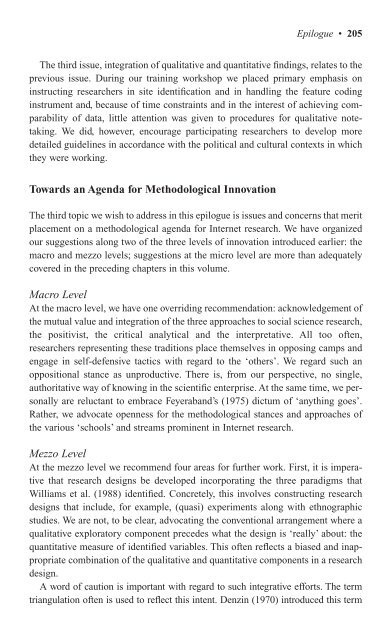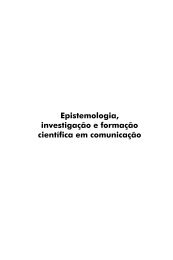Virtual Methods
Virtual Methods
Virtual Methods
You also want an ePaper? Increase the reach of your titles
YUMPU automatically turns print PDFs into web optimized ePapers that Google loves.
The third issue, integration of qualitative and quantitative findings, relates to the<br />
previous issue. During our training workshop we placed primary emphasis on<br />
instructing researchers in site identification and in handling the feature coding<br />
instrument and, because of time constraints and in the interest of achieving comparability<br />
of data, little attention was given to procedures for qualitative notetaking.<br />
We did, however, encourage participating researchers to develop more<br />
detailed guidelines in accordance with the political and cultural contexts in which<br />
they were working.<br />
Towards an Agenda for Methodological Innovation<br />
Epilogue • 205<br />
The third topic we wish to address in this epilogue is issues and concerns that merit<br />
placement on a methodological agenda for Internet research. We have organized<br />
our suggestions along two of the three levels of innovation introduced earlier: the<br />
macro and mezzo levels; suggestions at the micro level are more than adequately<br />
covered in the preceding chapters in this volume.<br />
Macro Level<br />
At the macro level, we have one overriding recommendation: acknowledgement of<br />
the mutual value and integration of the three approaches to social science research,<br />
the positivist, the critical analytical and the interpretative. All too often,<br />
researchers representing these traditions place themselves in opposing camps and<br />
engage in self-defensive tactics with regard to the ‘others’. We regard such an<br />
oppositional stance as unproductive. There is, from our perspective, no single,<br />
authoritative way of knowing in the scientific enterprise. At the same time, we personally<br />
are reluctant to embrace Feyeraband’s (1975) dictum of ‘anything goes’.<br />
Rather, we advocate openness for the methodological stances and approaches of<br />
the various ‘schools’ and streams prominent in Internet research.<br />
Mezzo Level<br />
At the mezzo level we recommend four areas for further work. First, it is imperative<br />
that research designs be developed incorporating the three paradigms that<br />
Williams et al. (1988) identified. Concretely, this involves constructing research<br />
designs that include, for example, (quasi) experiments along with ethnographic<br />
studies. We are not, to be clear, advocating the conventional arrangement where a<br />
qualitative exploratory component precedes what the design is ‘really’ about: the<br />
quantitative measure of identified variables. This often reflects a biased and inappropriate<br />
combination of the qualitative and quantitative components in a research<br />
design.<br />
A word of caution is important with regard to such integrative efforts. The term<br />
triangulation often is used to reflect this intent. Denzin (1970) introduced this term



